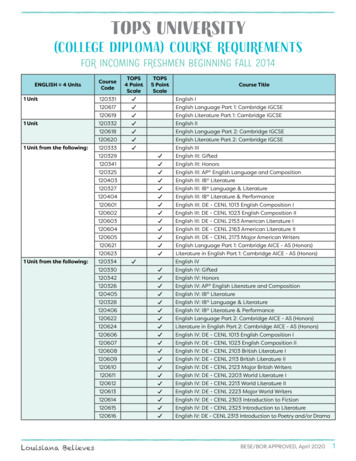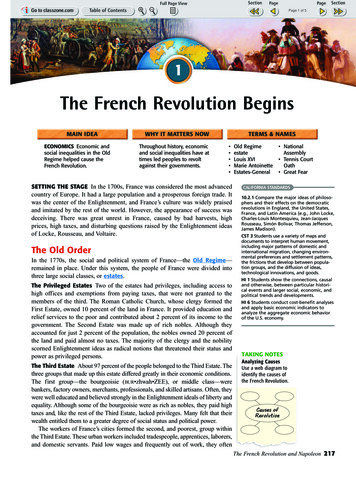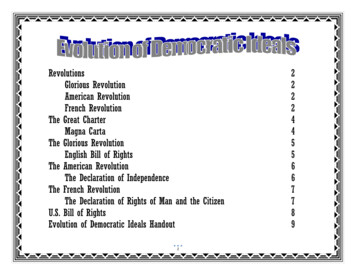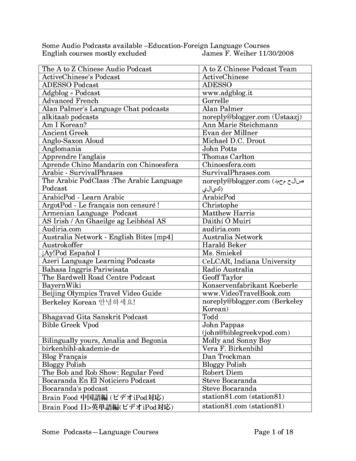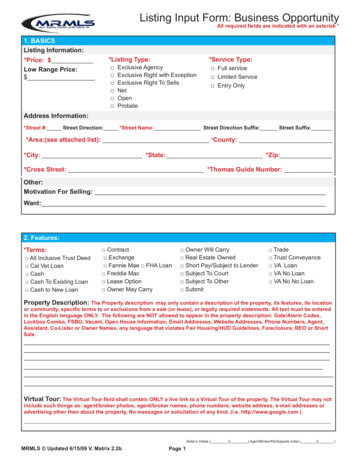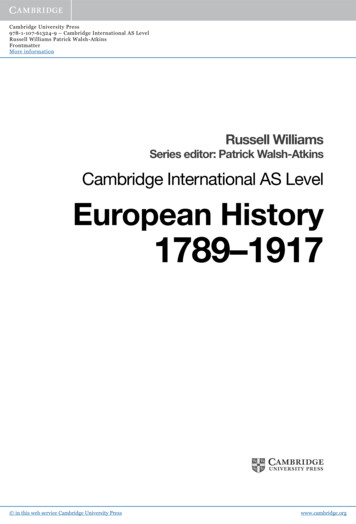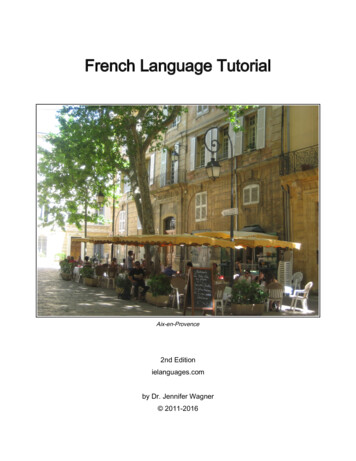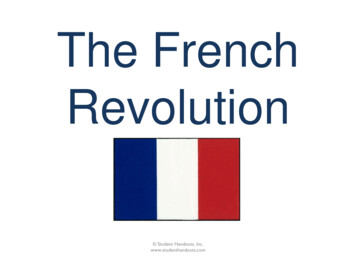
Transcription
The FrenchRevolution Student Handouts, Inc.www.studenthandouts.com
The Old Regime (Ancien Regime) Old Regime – socio-political system whichexisted in most of Europe during the 18th century Countries were ruled by absolutism – themonarch had absolute control over thegovernment Classes of people – privileged and unprivileged– Unprivileged people – paid taxes and treated badly– Privileged people – did not pay taxes and treatedwell
Society under the Old Regime In France, people were divided into three estates– First Estate High-ranking members of the Church Privileged class– Second Estate Nobility Privileged class– Third Estate Everyone else – from peasants in the countryside to wealthybourgeoisie merchants in the cities Unprivileged class
The Three EstatesEstateFirstPopulationPrivilegesExemptions Collected the tithe Censorship of the press Control of education Kept records of births, deaths,marriages, etc. Catholic faith held honoredposition of being the state religion(practiced by monarch andnobility) Owned 20% of the land Paid no taxes Subject to Churchlaw rather than civillaw Moral obligation (rather than legalobligation) to assist the poor andneedy Support the monarchy and OldRegime Paid no taxes Support the monarchy and OldRegime Nobles Collected taxes in the form offeudal dues Monopolized military and stateappointments Owned 20% of the land Circa 25,000,000 None None Paid all taxes Tithe (Church tax) Octrot (tax on goods brought intocities) Corvée (forced road work) Capitation (poll tax) Vingtiéme (income tax) Gabelle (salt tax) Taille (land tax) Feudal dues for use of local manor’swinepress, oven, etc. Circa 130,000 High-rankingclergySecondThird Circa 110,000 Everyone else:artisans,bourgeoisie, cityworkers,merchants,peasants, etc.,along with manyparish priestsBurdens
What does this contemporary political cartoon say about conditionsin France under the Old Regime?
Government under the Old Regime:The Divine Right of Kings Monarch ruled by divine right– God put the world in motion– God put some people in positions of power– Power is given by God– No one can question God– No one can question someone put in power byGod– Questioning the monarchy was blasphemy becauseit meant questioning God
What the King DidAppointed theIntendants, the “pettytyrants” who governedFrance’s 30 districtsAppointed the peoplewho would collect histaxes and carry out hislawsControlled justice byappointing judgesControlled the militaryCould imprison anyoneat any time for anyreason (blank warrantsof arrest were calledlettres de cachet)Levied all taxes anddecided how to spendthe moneyMade all lawsMade decisionsregarding war andpeace
Economic Conditions under theOld Regime France’s economy was based primarily onagriculture Peasant farmers of France bore the burden oftaxation Poor harvests meant that peasants had troublepaying their regular taxes– Certainly could not afford to have their taxes raised Bourgeoisie often managed to gather wealth– But were upset that they paid taxes while nobles didnot
France Is Bankrupt The king (Louis XVI) lavished money on himselfand residences like Versailles Queen Marie Antoinette was seen as a wastefulspender Government found its funds depleted as a resultof wars– Including the funding of the American Revolution Deficit spending – a government spendingmore money than it takes in from tax revenues Privileged classes would not submit to beingtaxed
Philosophy of the French Revolution:The Enlightenment (Age of Reason) Scientists during the Renaissance had discovered lawsthat govern the natural world Intellectuals – philosophes – began to ask if naturallaws might also apply to human beings– Particularly to human institutions such as governments– Philosophes were secular in thinking – they used reasonand logic, rather than faith, religion, and superstition, toanswer important questions– Used reason and logic to determine how governments areformed Tried to figure out what logical, rational principles work to tiepeople to their governments– Questioned the divine right of kings
Long- and Short-term Causes Long-term causes– Also known as underlying causes– Causes which can stem back many years Short-term causes– Also known as immediate causes– Causes which happen close to the moment the change or actionhappens Example: A person is fired from his or her job.– Long-term cause(s): The person is often late to work and isgenerally unproductive on the job.– Short-term cause(s): The person fails to show up for work anddoes not call the employer. Key: One typically does not happen without the other.Events which bring important change (or action) need bothlong-term and short-term causes.
Long-term Causes of the FrenchRevolutionEverything previouslydiscussedAlso Absolutism Unjust socio-politicalsystem (Old Regime) Poor harvests which leftpeasant farmers withlittle money for taxes Influence ofEnlightenment philosophes System of mercantilismwhich restricted trade Influence of othersuccessful revolutions England’s GloriousRevolution (1688-1689) American Revolution(1775-1783)
Short-term Causes of the FrenchRevolutionBankruptcy Caused by deficitspending Financial ministers(Turgot, Necker,Calonne) proposedchanges But these wererejected Assembly of Notablesvoted down taxationfor the nobility in 1787Great Fear Worst famine inmemory Hungry, impoverishedpeasants feared thatnobles at EstatesGeneral were seekinggreater privileges Attacks on noblesoccurred throughoutthe country in 1789Estates-General Louis XVI had nochoice but to call for ameeting of the EstatesGeneral to find asolution to thebankruptcy problem All three estates Had not met since1614 Set in motion a seriesof events whichresulted in theabolition of themonarchy and acompletely new sociopolitical system forFrance
Preparing for the Estates-General Winter of 1788-1789– Members of the estates elected representatives Cahiers– Traditional lists of grievances written by thepeople– Nothing out of the ordinary Asked for only moderate changes
Meeting of the Estates-General:May 5, 1789 Voting was conducted by estate– Each estate had one vote– First and Second Estates could operate as a bloc tostop the Third Estate from having its way First Estate Second Estate - vs. - Third Estate Representatives from the Third Estate demandedthat voting be by population– This would give the Third Estate a great advantage Deadlock resulted
FirstEstate 1 Vote or130,000Votes
Tennis Court OathThe Third Estate declared itself to be the National Assembly.Louis XVI responded by locking the Third Estate out of the meeting.The Third Estate relocated to a nearby tennis court where its members vowed to staytogether and create a written constitution for France.On June 23, 1789, Louis XVI relented. He ordered the three estates to meet togetheras the National Assembly and vote, by population, on a constitution for France.
Tennis Court Oath by Jacques Louis David
The Tennis Court Oath“The National Assembly, considering that it has beensummoned to establish the constitution of the kingdom, toeffect the regeneration of the public order, and to maintainthe true principles of monarchy; that nothing can prevent itfrom continuing its deliberations in whatever place it maybe forced to establish itself; and, finally, that wheresoeverits members are assembled, there is the National Assembly;“Decrees that all members of this Assembly shall immediatelytake a solemn oath not to separate, and to reassemblewherever circumstances require, until the constitution ofthe kingdom is established and consolidated upon firmfoundations; and that, the said oath taken, all members andeach one of them individually shall ratify this steadfastresolution by signature.”
Review Questions1. What was the OldRegime?2. How does anabsolute monarchy(absolutism) operate?3. Describe the size,privileges, exemptions,and burdens of thethree estates.4. What is deficitspending?5. Describe the type ofthinking used by thephilosophes.6. What were theunderlying (long-term)causes of the FrenchRevolution?7. What were theimmediate (short-term)causes of the FrenchRevolution?8. Explain the debateover voting whichoccurred in theEstates-General.9. What was theTennis Court Oath?
Four Phases (Periods) of the FrenchRevolutionNational Assembly (1789-1791)Legislative Assembly (1791-1792)Convention (1792-1795)Directory (1795-1799)
National Assembly(1789-1791) Louis XVI did notactually want awritten constitution When news of hisplan to use militaryforce against theNational Assemblyreached Paris on July14, 1789, peoplestormed the Bastille
Uprising in ParisPeople of Paris seizedweapons from the BastilleUprising spread throughoutFrance July 14, 1789 Parisians organized theirown government whichthey called the Commune Small groups – factions –competed to control thecity of Paris Nobles were attacked Records of feudal dues andowed taxes were destroyed Many nobles fled thecountry – became knownas émigrés Louis XVI was forced to flythe new tricolor flag ofFrance
Goodbye,Versailles! Adieu, Versailles! Parisian Commune feared that Louis XVI wouldhave foreign troops invade France to put downthe rebellion– Louis XVI’s wife, Marie Antoinette, was the sister ofthe Austrian emperor A group of women attacked Versailles onOctober 5, 1789– Forced royal family to relocate to Paris along withNational Assembly– Royal family spent next several years in the TuileriesPalace as virtual prisoners
Tuileries Palace (Paris, France)
Changes under the National AssemblyAbolishment ofguilds and laborunionsDeclaration of theRights of ManAbolition ofspecial privilegesConstitution of1791Equality before thelaw (for men)Many nobles leftFrance andbecame known asémigrésReforms in localgovernmentTaxes levied basedon the ability topay
Declaration of the Rights of ManFreedom ofreligionFreedom ofspeechFreedom ofthe raternity!”Right of thepeople tocreate lawsRight to a fairtrial
Declaration of the Rights ofWomanJournalist Olympe deGouges argued in herDeclaration of the Rightsof Woman that womenare equal citizens andshould benefit fromgovernmental reformsjust as men did.Women did gain somerights during theFrench Revolution, butthese were designedMadame JeanneRoland also served as for purposes othera leader in the women’s than liberating women.rights movement, and Women could inheritproperty, but only becausewas able to heavilydoing so weakened feudalisminfluence her husbandand reduced wealth among(a government official). the upper classes. Divorce became easier, butonly to weaken the Church’scontrol over marriage.
End of Special Privileges Church lands were seized, divided, and sold topeasants Civil Constitution of the Clergy requiredthat Church officials be elected by the people,with salaries paid by the government– 2/3 of Church officials fled the country rather thanswear allegiance to this All feudal dues and tithes were eradicated All special privileges of the First and SecondEstates were abolished
Reforms in Local Government The 30 provinces and their “petty tyrants”(Intendants) were replaced with 83 newdepartments– Ruled by elected governors New courts, with judges elected by thepeople, were established
Constitution of 1791 Democratic features– France became a limited monarchy King became merely the head of state– All laws were created by the Legislative Assembly– Feudalism was abolished Undemocratic features– Voting was limited to taxpayers– Offices were reserved for property owners This new government became known as theLegislative Assembly
Legislative Assembly (1791-1792) Royal family sought help from Austria– In June, 1791, they were caught trying to escape to Austria Nobles who fled the revolution lived abroad asémigrés– They hoped that, with foreign help, the Old Regime couldbe restored in France Church officials wanted Church lands, rights, andprivileges restored– Some devout Catholic peasants also supported the Church Political parties, representing different interests,emerged– Girondists– Jacobins
Opposition to the New Government European monarchs feared that revolution wouldspread to their own countries– France was invaded by Austrian and Prussian troops In the uproar, the Commune took control of Paris– Commune was led by Danton, a member of the Jacobinpolitical party Voters began electing representatives for a newconvention which would write a republicanconstitution for France– A republic is a government in which the people electrepresentatives who will create laws and rule on theirbehalf– Meanwhile, thousands of nobles were executed under thesuspicion that they were conspirators in the foreigninvasion
Convention (1792-1795) On September 22, 1792, the Convention metfor the first time Established the First French Republic Faced domestic opposition and strife– Girondists were moderates who represented therich middle class of the provinces– Jacobins (led by Marat, Danton, and Robespierre)represented workers Faced opposition from abroad– Austria, England, Holland, Prussia, Sardinia, and Spainformed a Coalition invading France
Abolishment of the Monarchy The Convention abolished the monarchy– As long as the royal family lived, the monarchy couldbe restored– Put the royal couple on trial for treason Convictions were a foregone conclusion– Louis XVI was guillotined on January 21, 1793– Marie Antoinette was guillotined on October 16,1793– Daughter Marie-Thérèse was allowed to go toVienna in 1795 She could not become queen because of Salic law, which didnot allow females to succeed to the throne– Son Louis-Charles, a.k.a. Louis XVII (lived 17851795) was beaten and mistreated until he died inprison
The three most memorableJacobins were GeorgesDanton, MaximilienRobespierre, and JeanPaul Marat.Because of a debilitatingillness, Marat was eventuallyforced to work from home.He was assassinated (in thetub while taking a medicinalbath) by CharlotteCorday, a Girondistsympathizer, in July, 1793.The Death of Marat by Jacques-LouisDavid
Growing Coalition against the French Convention drafted Frenchmen into the army to defeatthe foreign Coalition– These troops were led by General Carnot– The people supported military operations because theydid not want the country back under the Old Regime Rouget de Lisle wrote the “Marseillaise”– Became the French national anthem– Inspired troops as they were led into battle After two years– Coalition was defeated– France had gained, rather than lost, territory
Reign of Terror:September 5, 1793-July 27, 1794 Despite military successes, the Conventioncontinued to face problems domestically Danton and his Jacobin political party came todominate French politics Committee of Public Safety– Headed by Danton (and later Robespierre)– Those accused of treason were tried by theCommittee’s Revolutionary Tribunal– Approximately 15,000 people died on the guillotine Guillotine became known as the “National Razor” Including innovative thinkers like Olympe de Gouges andMadame Jeanne Roland
Committee of Public Safety
End of the Reign of Terror Members of the Girondist political party tried to end theReign of Terror initiated by the Jacobin political party– This opposition to the Committee of Public Safety causedmany Girondists to be tried and executed for treason Eventually, even Georges Danton wanted to end theexecutions– This resulted in Danton being tried and executed for treason Maximilien Robespierre became leader of theCommittee of Public Safety– He continued the executions– Convention came to blame Robespierre for the Reign of Terror Thermidorean Reaction– July 27, 1794 – ended the Reign of Terror– Convention sent Robespierre and other members of theCommittee of Public Safety to the guillotine Robespierre was guillotined on July 28, 1794
Constitution of the Year III of theRepublic (1795) With the foreign invaders vanquished and theReign of Terror at an end, the Convention wasfinally able to inaugurate its new constitution Constitution of the Year III of the Republic(1795) created the Directory
Government under the DirectoryExecutive 5 directors appointed by the LegislatureLegislature Lower house (500 members) proposed laws Upper house (250 members) voted on these laws 2/3 of the Legislature would initially be filled by membersof the ConventionQualifications Girondists (middle-class party) had defeated the Jacobins(working- and peasant-class party) Girondists’ constitution stated that suffrage (the right tovote), as well as the right to hold office, were limited toproperty owners
Other Parting ReformsPassed by the ConventionAdopted the metric systemDealt the final blow tofeudalism by abolishingprimogeniture (the systemwhereby the oldest soninherited all of his father’sestate)Drew up a comprehensivesystem of lawsEnded debt imprisonmentEnded slavery in France’scoloniesEstablished a nationwidesystem of public education
Directory (1795-1799)The Directory suffered from corruption and pooradministration.The people of France grew poorer and more frustratedwith their government.Despite, or perhaps because of, these struggles, the French developed astrong feeling of nationalism – they were proud of their country anddevoted to it.National pride was fueled by military successes.It would be a military leader – Napoleon Bonaparte, coming topower through a coup d’état – who would end the ten-year period(1789-1799) known as the French Revolution.
Review Questions1. What Paris buildingwas stormed on July14, 1789?2. What human rightswere established inFrance by theDeclaration of the Rightsof Man?3. How did Olympe deGouges fight forwomen’s rights?4. What were émigrés,and why did Frenchrevolutionaries viewthem as a threat?5. Name and describethe two politicalparties that competedfor power inrevolutionary France.6. What was theCommittee of PublicSafety?7. Describe the Reignof Terror and explainhow it eventually cameto an end.8. Were the “excesses”of the FrenchRevolution justified?Why or why not?9. Looking back at thefirst half of 1789, couldthe French Revolutionhave been avoided? Ifso, how?
The Old Regime (Ancien Regime) Old Regime - socio-political system which existed in most of Europe during the 18th century Countries were ruled by absolutism - the monarch had absolute control over the government Classes of people - privileged and unprivileged


